Family
Finding Love, and Jewish Community, in Nigeria
Like millions of others at the start of the pandemic, my life quickly morphed from the routine of in-person meetups to the world of online communication: Zoom calls, FaceTime and, of course, social media. When I needed to take a break from my at-home work as a production editor at a publishing company in Philadelphia, scrolling through Facebook became a default distraction from all the Covid news around me. It was a distraction that eventually brought me to Nigeria, where I fell in love with the local Jewish community—after falling in love with one of its leaders.
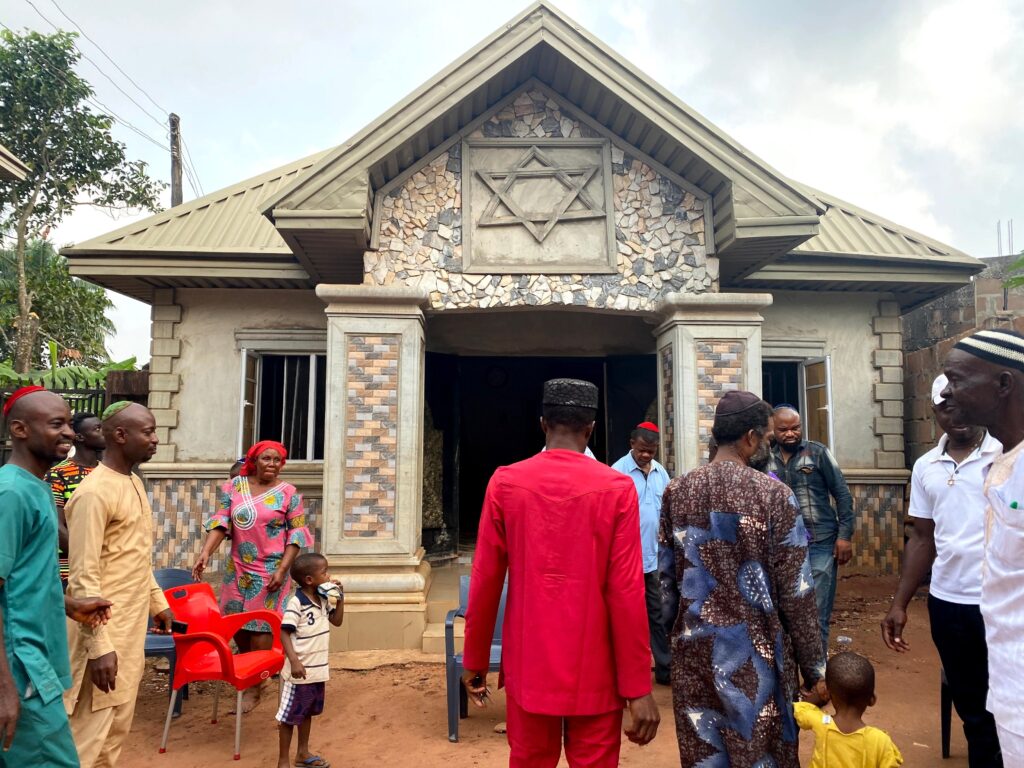
During one of my endless Facebook sessions last year, I came across a video my brother-in-law, Oren, shared from his childhood camp, Ramah in the Berkshires. The post had been written by a young Jewish man named Moshe Hezekiah Nwafor, who had re-shared a video of the Ramah Berkshires director, Ethan Linden, breaking the sad news that camp would not open for summer 2020. Moshe’s poignant words about his experiences as a staff member at the camp the previous year caught my attention.
After some Facebook digging, I learned that Moshe was Nigerian. My interest was piqued; I never knew there were Jews in Nigeria. I tried to reach out to Moshe directly, but he had strict privacy settings on his account, and I couldn’t send him a friend request or message. I could, however, “follow” his Facebook profile. Which I did, and that was enough.
The next morning, I woke up to both a friend request and a pending message from him. He introduced himself as a leader of Tikvat Israel Synagogue, a small but strong congregation of approximately 50 members in Kubwa, a village near Nigeria’s capital city of Abuja, located in the center of the country. We began to communicate regularly, discussing our similar experiences at Ramah—mine in the Poconos, his in the Berkshires, where he had been part of the Al-Hagova (outdoor education) staff working on the camp’s small farm. He had found the job with the help of Jewish Camps USA and Rabbi Wayne Franklin, senior rabbi emeritus at Temple Emanu-El in Providence, R.I., who I later learned is involved in outreach to Moshe’s community.
We shared the basics of our lives—he’s 22, I’m 25; he has five siblings, I have four; he’s an IT technician and ride-sharing driver, I work in publishing—as well as the state of the pandemic in our countries. In Nigeria, Moshe told me, lockdown restrictions hit especially hard. Thousands of Nigerians, including many Tikvat Israel members who work in service jobs, were laid off. With no stimulus package to aid struggling families, Moshe, who was also struggling to find work, had been raising money to provide food relief.
Soon, Moshe and I were corresponding for hours each day, graduating from Facebook messenger to iMessage and FaceTime. After several weeks, our friendship had clearly evolved into a romance—but a virtual one.
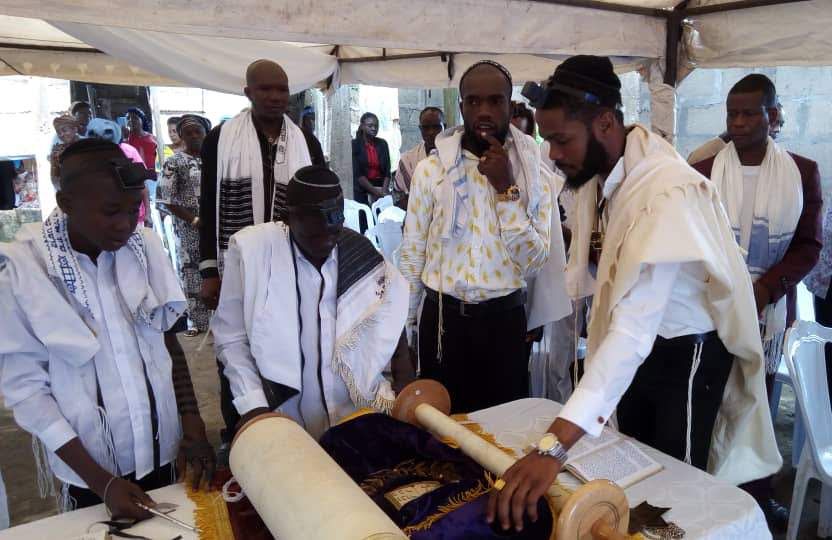
However frustrating those thousands of miles between us were, getting to know Moshe from afar gave me time to learn about him and his community. Many Nigerians, including most of those who identify as Jews, are part of the Igbo people, a meta-ethnicity with its own language and customs. Nigeria’s thousands of Jews—estimates range from 2,000 to 40,000—are spread throughout the country, whose total population is more than 200 million and is split almost evenly between Christians and Muslims. The Jews’ origins are a long and complicated history, which is examined in-depth in Re-Emerging: The Jews of Nigeria, a documentary available for streaming on Amazon. As with other African Jewish communities, such as the Abayudaya of Uganda, the Igbo Jews believe they descend from one of the lost tribes of Israel.
Several Igbo customs are similar to ones practiced in Judaism, including male circumcision on the eighth day after birth, following a lunar calendar and keeping dietary laws that approximate kashrut. These traditions had been followed for centuries, but when colonialism brought Christianity to Nigeria in the 18th century, many Igbos, like millions of other Africans, adopted the religion and abandoned some of these customs.
By the mid to late 20th century, several Igbos, including Moshe’s father, Sar Habbakuk Nwafor, founder of Tikvat Israel, began connecting the traditions of their parents and grandparents with the Jewish faith. Soon, they started to study and practice Judaism in earnest, abandoning Christianity entirely by the 1990s. News of the emerging interest in Judaism spread throughout Nigeria, bringing more and more Igbos to Jewish practices. Some family members who remain devout Christians continue to shun them. They face additional bias living in a country with significant separatist tensions—indeed, Jews generally avoid large outdoor religious gatherings and wearing kippot or tzitzit outside their homes and synagogues.
Eventually, interacting with each other virtually wasn’t enough; Moshe and I needed to figure out if we could make our relationship work. In November 2020, the United States Embassy in Abuja remained closed due to the pandemic, so it was impossible for Moshe to obtain a tourist visa to visit me. The only option was for me to go to him. I had to travel to Atlanta to get a visa, since Atlanta had the only Nigerian consulate still issuing them. I had to scramble to find a flight to Nigeria after my first one was canceled and arrange for pre-flight Covid testing as well as Airbnb quarantine accommodations in Abuja for after my arrival. And, because I was traveling to Western Africa, I had to obtain the standard vaccinations and medication.
When I landed and saw Moshe waiting outside the airport with a huge grin on his face, I knew I had made the right decision despite the difficulties.
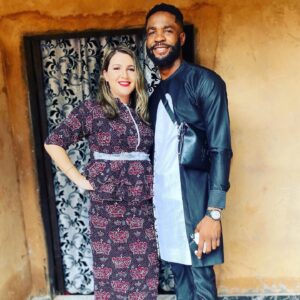
Before my trip, I had reached out to several Philadelphia-area synagogues as well as the Israel Center of Conservative Judaism in Flushing, N.Y., led by my father, Rabbi Moshe Saks, and the Huntington Jewish Center in Long Island, N.Y., led by my brother, Rabbi Ari Saks, for donations of tefillin, mezuzot, mahzorim, siddurim and tzitzit. I even managed to locate a large shofar to ring in the Jewish New Year, a special request from Moshe. So when Moshe brought me to his family’s compound in Kubwa, I didn’t arrive empty-handed. The first to greet me was Moshe’s father, whose warm, infectious smile instantly made me feel at home.
The warm welcome carried over into my first Shabbat in Nigeria. It was amazing to see people whose existence was unknown to me only months before daven and read Torah beautifully. Most of the tunes were unfamiliar to me, so I hummed along while reading the tefillot, letting the melodies and spiritual warmth wash over me. I was particularly impressed by the synagogue’s hazzan, a role filled by the most recent bar mitzvah boy. Watching 13-year-old Shmuel Ben Baruch daven Shacharit—the hazzan leads the morning gathering while others take turns running the other services—made it apparent how devoted the community is to educating its youth.
We gathered for kiddush in a small room next to the sanctuary, which is housed in a building on Sar Habbakuk’s property. The challah had been baked over a coal stove by Moshe’s mother, Hulder, who is the “ema” of the shul, a role similar to a rebbetzin. The unbraided loaf was smaller and darker than traditional Ashkenazi challah, and its texture was dense—and delicious. Lunch was spicy fish stew with rice, a typical Shabbat meal for the congregation.
As the special guest, each Shabbat I spent in Nigeria, I was tasked with giving a dvar Torah, something I hadn’t done since my bat mitzvah. I consulted with the rabbis in my family via FaceTime to come up with something new to teach my hosts and their congregants. But each Shabbat, most already knew the midrash or commentary I shared. Each Shabbat, it was me learning from them.
I encountered that same feeling later in my trip, when Moshe and I traveled 300 miles south to the state of Anambra for the wedding of his sister, Shiloh. We visited five synagogues in Anambra and at each, the locals asked if they were making any mistakes in their practice of Judaism. They weren’t. Jews in Nigeria have expended so much effort to study Judaism that the longer I spent with them, the more I felt like an imposter.
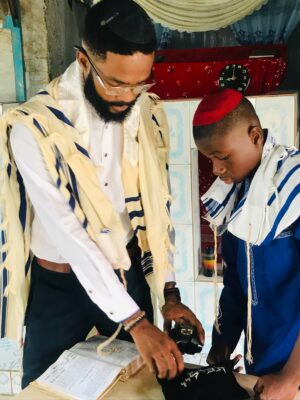
One reason for this perpetual state of learning is because Nigerian Jews realize that, whatever the exact nature of their religious origins, for centuries, their ancestors had not practiced Judaism. Ultimately, they feel that they must convert to become halachically Jewish—and that takes study.
Over the last 15 years, rabbis involved in kiruv organizations, most notably Kulanu, which supports emerging and returning Jewish communities around the world, have visited the Igbo Jews, bringing with them religious items and teachings. But few Nigerians have undergone conversion because usually only one clergy person—such as Franklin of Temple Emanu-El or Rabbi Howard Gorin, retired leader of Tikvat Israel Congregation in Rockville, Md., after whom Sar Habbakuk named his own synagogue—visits at a time, and conversion requires a three-person beit din.
When I learned of the congregants’ desire to convert, I reached out to my father, Rabbi Moshe Saks, who offered to form a Conservative beit din for their conversion this summer. His first action was to ask Rabbi Gershom Sizomu, the leader of the Abayudaya in Uganda, to head the panel. (In 2008, Sizomu received smicha from the Ziegler School of Rabbinic Studies at the American Jewish University.) Sizomu is a familiar face to Moshe, since he traveled to Uganda in 2014 to study at Sizomu’s yeshiva. During Moshe’s time with the Abayudaya, he underwent conversion, making him one of only six Nigerians to do so.
But soon, there will be more converted Jews in Nigeria. Tikvat Israel members are busily preparing for a mass conversion—of approximately 50 people—in August that will be overseen by Sizomu, my father and Rabbi Gerald Sussman of Temple Emanu-El in Staten Island, N.Y. Bonita Nathan Sussman, Sussman’s wife, will also make the trip in her capacity as a Kulanu vice president and liaison to newly emerging, returning and isolated Jewish communities.
All that studying, all those years of living Jewish lives, will formally bring these men and women into the Jewish tent. Their determination is understandable: I have heard from many in Moshe’s community that while they primarily want to convert to self-affirm their Jewish identities, they also struggle to validate their Jewishness to the rest of the Jewish world.
In addition to getting to know Nigeria’s Jewish community during my trip, Moshe and I spent the time getting to know each other, spending every day together—and falling further in love. Toward the end of my trip, on the eve of his sister’s wedding, Moshe proposed. I was still in my pajamas when he planted the ring inside my breakfast of eggs with spicy indomie noodles, which have a similar texture to Ramen. I looked up with startled eyes to see Moshe on a bended knee. I happily said yes!
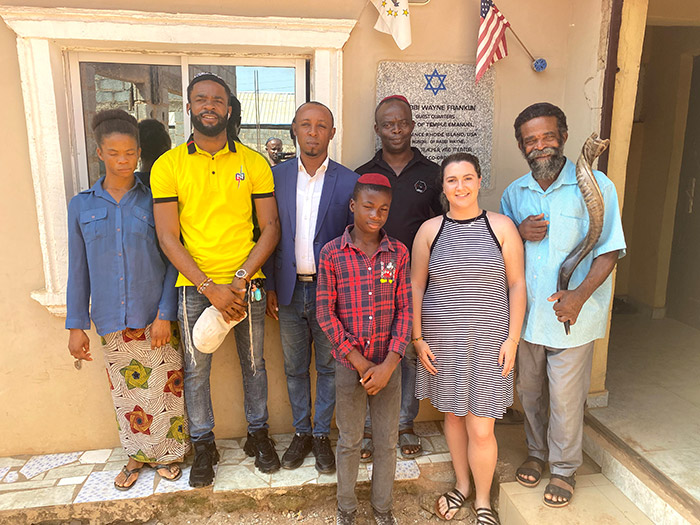
I will be returning to Nigeria with several family members in August for the conversion. It was heartbreaking to have to leave Moshe at the beginning of January, right after we got engaged, but we were able to reunite in Rwanda at the end of April for a quick visit and to prepare for the conversion.
Meanwhile, Moshe and I will continue working to obtain a K-1 visa for him to travel to the United States—still challenging due to the pandemic—where we will legally marry and stand under the chuppah for our Jewish wedding, which I want to celebrate surrounded by my family. Beyond that, our happily ever after includes establishing an organization to aid the Jews of Nigeria and other African Jewish communities.
Eliana Saks is a freelance writer in Philadelphia. For more information on the Kubwa Jewish community, email moshehezekiah@gmail.com or visit the Facebook page of Tikvat Israel Synagogue, Abuja Nigeria.










 Facebook
Facebook Instagram
Instagram Twitter
Twitter
alice i. jena says
Mazel Tov! May you and all be blessed with good health and happiness always. Your father is my Rabbi. A wonderful human; as is your dear mother.
David Bickman says
Mazal Tov, Eliana!!! What a wonderful story.
Judy Schaffert says
Eliana comes from a very distinguished rabbinic family. Her maternal grandfather, Rabbi Alexander Shapiro z”I was the president of the conservative rabbis’ organization in the 1970s (and my father’s oldest and dearest friend). Her parents, grandmother Ruth, and the entire family are warm, wonderful people.
Terry Stafford says
Mazal Tov, Eliana and Moshe -and to your whole family! I have fond memories of meeting you when you were a girl in Calgary and I spent a wonderful visit in your home. Big hugs! T
erry
jennifer gallop says
Thank you for sharing this. Mazal tov on your engagement and all best luck in your endeavors together. I look forward to meeting Moshe at a Shapiro simcha.
From jennifer gallop (Friend is Nomi and David)
Karen Gens says
Eliana,
What a wonderful story. Wishing you and Moshe the best always.
I work for a non-profit that you may be interested in. It is the North American Conference on Ethiopian Jewry. We have an office in New York City and in Lod, Israel. Our website and my email address are below.
Karen Gens
Donna Kirschner says
Nomi sent me this article. Mazal tov! Thank you so much for sharing this amazing, unfolding treasure. Best of luck to you and Moshe in your vital work.
Tambor Natalie says
Mazal tov Eliana. As a close friend of your grandmother Ruth Shapiro I have been following the exciting and inspiring story of your relationship with Moshe, his family and the Nigerian Jewish community. We wish you all mazal and a long and happy marriage.
Natalie Tambor
Jeni says
Mazel Tov!
Amy Budish says
A beautiful, uplifting story! During this time of rancor and divisiveness , it’s especially heartening to learn of such devotion to our Jewish heritage & the ethical compass of our faith.
Sharon Komforty says
Mazel Tov Eliana! I really enjoyed reading your Beautiful story! I never knew much about the Jews of Nigeria, so you could say I got a real history lesson today. I learned so much and it opened my eyes. I will definitely watch the documentary too! Thanks again and many blessings to You and Moshe!!
Jeff Lieberman says
Thank you Eliana for shouting out “Re-Emerging: The Jews of Nigeria”. The documentary can be viewed on Amazon Prime, Vimeo and on DVD. All the links can be found at http://www.re-emergingfilm.com
Ejike Chukwuma says
Mazal tov/Daalu nu Eliana and Moshe. May the berakah that Yahuah promised comes with finding a wife come upon you. Meanwhile,I would love to correct something. The designation should be The Igbo Jews or better still The Igbo-Ibrim. The reason is that the Igbo are fighting to recede from Nigeria and create their own Jewish state in Africa and the term Nigerian Jews is repulsive to millions of Ndi Igbo.
Florence Rutcofsky says
Mazel tov to you Eliana and the entire families involved in this Simcha. A wonderful event. Love from Faye Rutcofsky . Your father Rabbi Moshe Saks is my Rabbi from Israel Center of Conservative Judaism.
Ifagbemijo Amosun Ifakayode says
Mazel tov! Thank you for sharing your heartwarming story and for shedding more light on the little-known communities of Jewish people in Nigeria.
Adah and Rob Sylvan says
Your personal story is beautiful and the Igbo history is amazing. A hearty mazel tov to you both… and so happy to be able to zoom the ceremony ….Adah and Rob Sylvan (Israel Center of Conservative Judaism members)
Nz'r. Okee-IGBO says
Mazel tov, umuibe
Grace says
Pls I need that prayer tallit for my boy, Were can I buy
Sahrah Pock says
Mazal tov to you both your families and the communities you serve, personally and by example.
Caring,
Sahrah
Etimbuk Bassey says
Hello, My name is Etimbuk Bassey,
I am seeking to learn more about the Jewish community in Nigeria.
How do I get in contact with the Rabbi or somebody who can give me more information?
Can somebody help me please?
My number is +2348125045284
Email: etimbkbassey@gmail.com